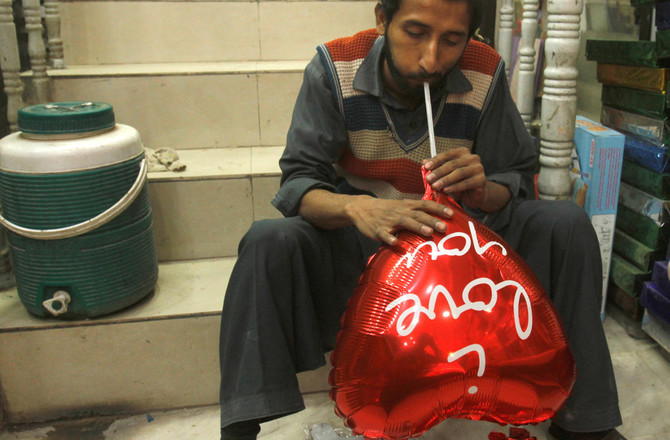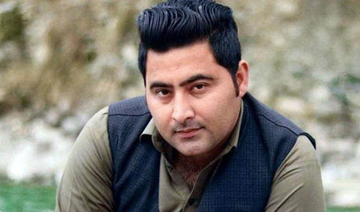ISLAMABAD: Pakistan’s media regulator has warned television channels and radio stations to refrain from promoting Valentine’s Day after a court banned celebrations last year.
Valentine’s Day is increasingly popular among younger Pakistanis, with many taking up the custom of giving cards, chocolates and gifts to their sweethearts to mark the occasion.
But the country remains a deeply traditional Muslim society and many disapprove of the holiday as a Western import.
Pakistan’s President Mamnoon Hussain told a crowd of students in 2016 that the day had no place in the Muslim-majority nation and urged young people to focus on their studies instead.
Last year, the Islamabad High Court prohibited celebrations in public spaces and government offices across the country.
In a Twitter post Wednesday, the Pakistan Electronic Media Regulatory Authority (PEMRA) said last year’s ban was still in place and urged the media to “desist from promoting” the festivities.
Social media users were quick to respond, with some mocking the regulatory body.
“Hate preechers who incite violence in name of Islam are back on air. These hate monger are promoted & protected by the state of #Pakistan. But love speak and red heart balloon and flower vendors are a danger to this republic and Islam,” journalist Ahmad Noorani posted on Twitter.
Another user Adnan Sami commented on Facebook: “PEMRA directs media to refrain from promoting Valentine’s Day, PEMRA never directs media from promoting hate monger Mullahs.”
Others lauded the decision, echoing the views of officials who have previously blasted the celebrations as “vulgar and indecent.”
Ali Danish said on Twitter: “Pemra did right. What sort of love do you want to spread via Valentine’s day? Us distancing ourselves from islam is haunting us big-time.”
Pakistan warns media against promoting Valentine’s Day
Pakistan warns media against promoting Valentine’s Day

‘Offensive’ Muslim fintech ads banned in UK for showing burning banknotes

- Posters by Wahed Invest were banned by Advertising Standards Authority after agency received 75 complaints
LONDON: Adverts by Muslim fintech company Wahed Invest have been banned in the UK for featuring burning banknotes, which the country’s advertising watchdog deemed “offensive.”
The New York-based investment platform, which targets the Muslim community, ran a series of posters across London’s transport system in September and October.
The ads showed US dollar and euro banknotes on fire alongside slogans such as “Join the money revolution” and “Withdraw from Riba” — a term referring to the Islamic prohibition of interest.
The Advertising Standards Authority said it received 75 complaints that the ads were offensive.
“The ads represented the expression that viewers’ money was ‘going up in flames’ and that images of burning money were commonly encountered,” the ASA said in a statement.
“However, regardless of whether viewers would have understood that message or understood it as a defiant act designed to show a challenge to financial institutions, the currencies which were burned in all of the ads were clearly visible as US dollar and euro banknotes.”
The advert also featured images of Muslim preacher Ismail ibn Musa Menk and Russian former professional mixed martial artist Khabib Abdulmanapovich Nurmagomedov.
Three of the posters showed Menk holding an open briefcase filled with US dollar and euro banknotes on fire, with two of them stating “Withdraw from Exploitation.”
Wahed defended the campaign, explaining that the burning banknotes symbolized money “going up in flames” due to inflation outpacing savings growth.
The company, which describe itself as an investment platform allowing consumers who were predominantly Muslim to invest in a manner which aligned with their faith and values, launched in the US in 2017 and is backed by the oil company Saudi Aramco and the French footballer Paul Pogba.
Wahed acknowledged that the currencies depicted in the ads could be viewed as symbols of national identity but argued that the imagery of burning money was a powerful reference to hyperinflation, a concept often depicted in popular culture through film and television.
A spokesperson added: “We understand that visuals like those included in our campaign can elicit strong reactions.
“While our intention was to spark thought and awareness, we recognize the importance of ensuring that messaging resonates positively with the diverse audiences that may consume them.”
The ASA said that the adverts would have been seen by many people, including people from the US and eurozone countries, who “would have viewed their nation’s currency as being culturally significant.
“Although we acknowledged Wahed Invest’s view that they had not directly criticized a specific group, and that depictions of burning banknotes were commonly encountered, we considered the burning of banknotes would have caused serious offense to some viewers,” the regulator said.
“We therefore concluded that the ads were likely to cause serious offense.”
Jailed Italian reporter in Tehran freed, says Italy

ROME: An Italian journalist arrested in Iran and jailed for three weeks has been freed and is returning to Italy, Prime Minister Giorgia Meloni’s office said on Wednesday.
“The plane taking journalist Cecilia Sala home took off from Tehran a few minutes ago” following “intense work through diplomatic and intelligence channels,” Meloni’s office said in a statement.
“Our compatriot has been released by the Iranian authorities and is on her way back to Italy. Prime Minister Giorgia Meloni expresses her gratitude to all those who helped make Cecilia’s return possible, allowing her to re-embrace her family and colleagues,” her office said.
Meloni personally informed Sala’s parents of her release by telephone, it added.
Sala, 29, was arrested on December 19, soon after the United States and Italy arrested two Iranian nationals over export violations linked to a deadly attack on American servicemen.
The journalist, who writes for the Italian daily Il Foglio and is the host of a news podcast produced by Chora Media, was kept in isolation in Tehran’s Evin prison.
Sala told her family she was forced to sleep on the floor in a cell with the lights permanently on.
Italy and Iran summoned each other’s ambassadors last week after Rome warned that efforts to secure her release were complicated.
Sala traveled to Iran on December 13 on a journalist’s visa. She was arrested six days later for “violating the law of the Islamic Republic of Iran,” said the country’s culture ministry, which oversees and accredits foreign journalists.
She had been due to return home the following day.
On Monday, Iran denied any link between Sala’s arrest and that of Iranian national Mohammad Abedini, detained in Italy in December at the behest of the United States over export violations linked to a deadly attack on US servicemen.
Surge in Telegram user data passed to French authorities

- Pavel Durov was arrested in Paris in August, where he was held for four days before being charged with various crimes, mostly linked to control of criminal content on Telegram
PARIS: Messaging service Telegram passed vastly more data on its users to French authorities in the second half of 2024 following founder Pavel Durov’s arrest in Paris, figures published by the platform showed.
The company said it handed over IP addresses or telephone numbers that Paris asked for in 210 cases in July-September and 673 in October-December.
That was up from just four in the first quarter and six in the second.
Some 2,072 users were affected by French requests for user data — again massively weighted toward the second half of 2024, with more than half in the fourth quarter alone.
Pavel Durov was arrested in Paris in August, where he was held for four days before being charged with various crimes, mostly linked to control of criminal content on Telegram.
He and his supporters have claimed that most French and European authorities’ requests for user data were simply not being sent to the right department at the company and therefore received no response.
Durov, who holds Russian, French and United Arab Emirates passports, has been barred from leaving French soil since he was charged.
That has not stopped Telegram from issuing updates to its moderation rules supposed to boost cooperation with investigators.
A source familiar with Durov’s case told AFP in December that the platform was responding more frequently to requests from the judicial system from both France and other countries.
Getty Images, Shutterstock gear up for AI challenge with $3.7bn merger

- Deal faces potential antitrust scrutiny
- Merger aims to cut costs and unlock new revenue streams as companies grapple with the rise of generative AI tools
LONDON: Getty Images said on Tuesday it would merge with rival Shutterstock to create a $3.7 billion stock-image powerhouse geared for the artificial intelligence era, in a deal likely to draw antitrust scrutiny.
The companies, two of the largest players in the licensed visual content industry, are betting that the combination will help them cut costs and grow their business by unlocking more revenue opportunities at a time when the growing use of generative AI tools such as Midjourney poses a threat to the industry.
Shutterstock shareholders can opt to receive either $28.80 per share in cash, or 13.67 shares of Getty, or a combination of 9.17 shares of Getty and $9.50 in cash for each Shutterstock share they own. The offer represents a deal value of more than $1 billion, according to Reuters calculations.
Shutterstock’s shares jumped 22.7 percent, while Getty was up 39.7 percent. Stocks of both companies have declined for at least the past four years, as the rising use of mobile cameras drives down demand for stock photography.
Getty CEO Craig Peters will lead the combined company, which will have annual revenues of nearly $2 billion and stands to benefit from Getty’s large library of visual content and the strong community on Shutterstock’s platform.
Peters downplayed the impact of AI on Tuesday and said that he was confident the merger would receive antitrust approval both in the United States and Europe.
“We don’t control the timing of (the approval), but we have a high confidence. This has been a situation where customers have not had choice. They’ve always had choice,” he said.
Some experts say US President-elect Donald Trump’s recent appointments to the Department of Justice Antitrust Division signal that there would be little change to the tough scrutiny that has come to define the regulator in recent years.
“With Gail Slater at the helm, the antitrust division is going to be a lot more aggressive under this Trump administration than it was under the first one,” said John Newman, professor of law at the University of Miami.
Regulators will examine how the deal impacts the old-school business model of selling images to legacy media customers, as well as the new business model of offering copyright-compliant generative-AI applications to the public.
The deal is expected to generate up to $200 million in cost savings three years after its close. Getty investors will own about 54.7 percent of the combined company, while Shutterstock stockholders will own the rest.
Getty competes with Reuters and the Associated Press in providing photos and videos for editorial use.
Israel extends closure of Al Jazeera’s West Bank office

- Israel suspended Al Jazeera’s Ramallah office for 45 days in September on charges of “incitement to and support for terrorism”
- Announcement comes days after Palestinian Authority also suspended the network’s broadcasts for four months
RAMALLAH, Palestinian Territories: Israeli authorities renewed a closure order for Al Jazeera’s Ramallah office in the occupied West Bank on Tuesday, days after the Palestinian Authority suspended the network’s broadcasts for four months.
An AFP journalist reported that Israeli soldiers posted the extension order Tuesday morning on the entrance of the building housing Al Jazeera’s offices in central Ramallah, a city under full Palestinian Authority security control.
The extension applies from December 22 and lasts 45 days.
In September, Israeli forces raided the Ramallah office and issued an initial 45-day closure order.
At the time, staff were instructed to leave the premises and take their personal belongings.
The move came months after Israel’s government approved a decision in May to ban Al Jazeera from broadcasting from Israel, also closing its offices for an initial 45-day period, which was extended for a fourth time by a Tel Aviv court in September.
Later in September, Israel’s government announced it was revoking the press credentials of Al Jazeera journalists in the country.
Prime Minister Benjamin Netanyahu’s government has long been at odds with Al Jazeera, a dispute that has escalated since the Gaza war began following Hamas’s attack on southern Israel on October 7.
The Israeli army has repeatedly accused the network’s reporters in Gaza of being “terrorist operatives” affiliated with Hamas or Islamic Jihad.
The Qatari channel denies the accusations, and says Israel systematically targets its staff in Gaza.




















